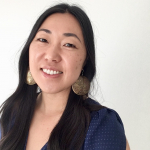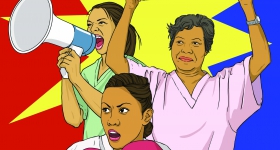To My Fellow Asian Americans,
As a community, the COVID-19 pandemic has impacted many of us.
Like everyone else, you probably had pre-existing stressors in your life before the COVID-19 pandemic: the pressure to get that A+, another promotion (even if you just got one), or taking care of your parents because of all that they’ve sacrificed and even if no one said it, you know it’s expected of you to repay that debt. Now combined with the very strange existence we are facing, isolated from others without access to our usual resources, it’s a perfect storm for making even the most resilient person feel overwhelmed. You might even notice this overwhelm in your body as chest pains, head tension, knots in your stomach, or a strange numbness that doesn’t seem to fade.
In these unprecedented times how can we support ourselves so we can stay functional and supportive to those around us? Why not talk to a psychotherapist? I know, I’m biased. However, now might actually be a great time to start.
I get that you might have apprehensions. I certainly did when I first started considering therapy. Now looking back, I wish I started sooner, but I was ashamed, skeptical, and not sure how it would be any different from venting to one of my besties. So, please allow me to unveil some of the happenings inside psychotherapy sessions. Oh and please note that I can only speak to the dynamic and processes that occur between my clients and me. Other therapists might work differently.
During sessions, my clients and I laugh, curse, and cry. I even hand out imaginary “therapy trophies” when we reach milestones. Yes, milestones. I give clients a skills checklist that outlines the skills I’ll be sharing with them. Each time they demonstrate independent capacity to implement any new skill they’ve learned, we take time to celebrate the growth and sometimes that’s in the form of handing out “trophies.” When I was teaching one client cognitive restructuring she exclaimed “I never thought going to therapy was going to be practicing yoga for my brain!” I have another client who started announcing that she’s ready to have her brain “flossed” whenever she enters my office. She began this after I taught her how our egos can cloud our perceptions and cause us unnecessary emotional distress and conflict. I like to think of psychotherapy as re-coding and upgrading our mental software.
Yes, of course there are times when we touch on heavy issues, but for many this offers a release, understanding, and a way forward. Such issues could be if you had to take on adult responsibilities at a young age, were constantly criticized and/or yelled at as a child, had parents who divorced, were alcoholics, or were just so busy trying to make ends meet they didn’t have time to show up to your softball games. They could also include abuse of any kind, a natural disaster (yes, a pandemic counts), birth trauma, a medical procedure, or a life-threatening accident. These types of experiences leave an impact on our nervous systems and often make people feel stuck. A therapist trained in somatic and integrative trauma reprocessing such as Eye Movement Desensitization Reprocessing (EMDR) or Acceptance Commitment Therapy (ACT) (ACT is my jam) can walk you through processes that significantly reduce distressing memories at a subconscious level. As a result you could experience fewer nightmares, depression, brain fogginess, triggers, anxiety, and instead more restful sleep, motivation, and focus. In addition, reprocessing can help you build your self-confidence and free you from that pervasive feeling of being stuck so you can start taking action towards your goals.
Upgrading your mental operating system and healing trauma is only the beginning. I think therapy can also offer us Asian Americans a unique sort of solidarity. I remember a client who felt shame when admitting that she didn’t know how to answer me when I asked her how she was feeling. But after some inquiry, she was soon telling me how she felt by describing it in analogies. I explained that in Asian American communities, we often use metaphors and analogies to express our internal experiences. Her eyes widened and her jaw dropped, “Oh... I just thought I was emotionally inept.” She had internalized the predominant western way of reporting emotions as the only way, which made it difficult for her to recognize how she expressed emotions naturally. It was such a gift to reassure her that there was nothing wrong with her. I taught her how to tap into her authentic way of expressing and then to code switch so she could feel competent communicating her emotional experience when more western ways of communication were expected.
The tendency to assume our differences are “wrong” is a common and ongoing struggle for people of color. And I think it’s a contributing factor to why Asian Americans don’t start or return to therapy. To be honest, there is the reality that western psychology assumes that western values and ideas are the “norm.” Sadly, this can set up even the most well-meaning therapist to believe that other ways of thinking, relating, or behaving are “abnormal,” when they simply diverge from western culture.
I don’t want to add to any hesitation about seeking support but I do want to encourage you to be persistent in finding the right therapist for you. This might mean finding a therapist who understands the unique dynamics at play in Asian American families and who won’t judge them. A therapist who can acknowledge how concepts such as enryo, nunchi, or máfan might influence how you view yourself and affect interpersonal relationships. A therapist who can help you to navigate the fine line between collectivism and codependency. Or a therapist who can help you find ways to code switch so you can succeed in this western world while not abandoning your ancestral heritage, a tricky path to walk that doesn’t have a one-size-fits-all answer. And to be clear, such a therapist exists and such a therapist may or may not be of Asian descent themselves.
So, if you’ve been thinking about giving it a try, why not now? Especially during a time when we could all use some extra support.
If you’ve read this far, thank you. I hope it’s given you insight into the process of psychotherapy and made it more inviting.
To Our Collective Healing,
Abigail
@therapyforwomensf
P.S. Check out Hyphen’s guide to finding a therapist.










Comments